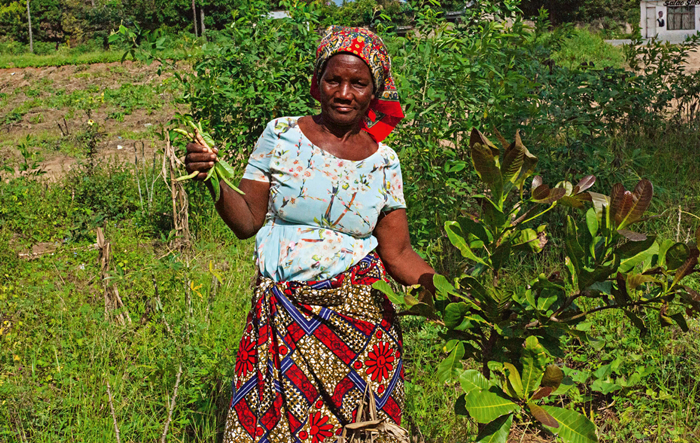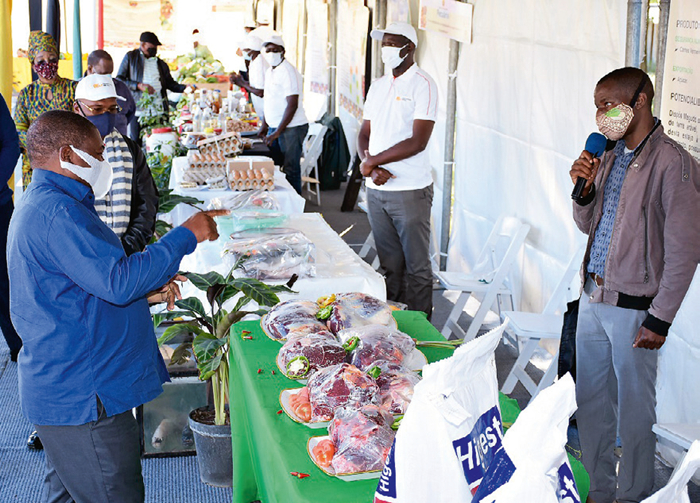|
||||||||||
| Home Nation World Business Opinion Lifestyle ChinAfrica Multimedia Columnists Documents Special Reports |
|
||||||||||
| Home Nation World Business Opinion Lifestyle ChinAfrica Multimedia Columnists Documents Special Reports |
| ChinAfrica |
| Small Farms, Big Impact |
| Small farmers form the critical part of Mozambique’s Agricultural Marketing Campaign 2022-23 |
| Reporting from Mozambique Paulo Mendes 丨VOL. 14 JUNE 2022 ·2022-06-09 |

Madalena João shows produce on one of her farms (PAULO MENDES)
It is 4:00 a.m. on a wintery Saturday in the district of Limpopo, Gaza Province in Mozambique. Madalena João, a widow, wakes up her 16-year-old daughter and her pregnant daughter-in-law to get ready for farm work.
João has four farms, each more than 2 hectares. The 58-year-old, who has never attended school, only knows farming. Unfortunately, she has had poor crop yields in recent years due to lack of rain. This year the rains were on time and she hopes for good crop. That’s why she needs the help of her family.
“The corn plants are already knee-high and we need to start weeding for them to grow well. We finally had rain this month and that’s why we need to take care of the plantation so that we have good production,” said João, who has seven children, three stepchildren and five grandchildren, most of whom now have their own lives in urban areas.
In the past years, everything João produced was used to feed her family.
However, thanks to the implementation of the country’s Agricultural Marketing Campaigns, she has recently been able to sell a big part of what she produces and use the income to cover household expenses.
Sales channels
This campaign was introduced in 2020, as part of the Mozambican Government’s plans to encourage the involvement of all farmers, such as João, in the agrarian marketing process. The aim is to ensure that the crop production of the provinces finds placement channels in the market, both for commercial and family consumption.
João said the speech that Mozambican President Filipe Nyusi gave during the launch of the Agricultural Marketing Campaign 2022-23 motivated her, and she is now excited to be part of this campaign.
For her, this has been one of the best initiatives in the agricultural sector. For the first time in her life, she is able to sell her farm products and use the income to pay for school materials for her grandchildren, pay transport to and from the farm, buy herself some new clothes and hire people to help in her farms.
“My oldest daughter has separated from her husband and now she and her three children are living with me. Thanks to the money I earn from the sales in the campaign, she was able to start a small business and use that money to take care of her children, my grandchildren,” said João.
Of her four farms, three are used for the production of maize, beans and peanuts, produced mainly for sale. On the fourth farm, that is close to her house, the produce is exclusively used to meet the daily food needs of her family.
“When I want to cook something at home and I don’t want to spend money going shopping, I just go to my farm close to home, take what I want and come back home to cook for my family and myself. My daughters do the same,” said João.

Mozambican President Filipe Nyusi (front left) launches the Agricultural Marketing Campaign in Maputo, Mozambique, on June 19, 2020 (MOZAMBICAN PRESIDENCY WEBSITE)
Investing in agriculture
Nyusi said in the speech during the campaign launch in April, thanks to small producers, the government has been motivated to invest in the agricultural sector as a way to mitigate calamities such as COVID-19, climate change, and international conflicts from negatively affecting agricultural production.
“These investments were accompanied by the emergence of new industries and investments in transport infrastructure, electricity, water supply and roads, which contributed to the economic recovery, with the record last year of 2.1 percent, in terms of growth in the GDP,” said Nyusi.
He said Mozambique has seen an increase in cultivated areas and in productivity rates, with emphasis on the growth of rice and maize production by 19 percent and 13 percent respectively.
In Mozambique, agriculture has been one of the first sources of funding for the state with a contribution of around 25 percent of GDP. For this reason, it is a priority for the present government to improve agricultural production in the country at all levels, starting with the motivation of small producers such as João.
“It is from agriculture that we obtain our food, which, when it is lacking, jeopardizes the normal development of the most important factor of production - humans. It is in the countryside where most of our people live and work. It is from the countryside where the products we export come from, such as cashews, sugar, sesame, pigeon peas, cotton, tobacco and macadamia nuts, which bring us foreign exchange that our economy needs to import what we do not produce,” said Nyusi.
Households lead production
In Mozambique, agricultural production is fundamentally carried out by three distinct sectors, namely, the business sector, cooperative/associative sector and the family sector like João’s family.
The family sector is responsible for most of the products consumed and exported in the country; but this was the sector that least benefited from the production effort because it faced many difficulties in accessing the market.
According to Nyusi, the implementation of the Agricultural Marketing Campaign in 2020 changed that and Mozambique has registered an improvement in the agricultural sector in the last two years. In the first quarter of 2022, exports of agricultural products recorded an increase of around $80 million, corresponding to around 88 percent of all produce in Mozambique, mainly influenced by the increase in pulses and almonds.
In the current 2022-23 campaign, 17.28 million tons of agricultural products are expected to be sold. Of this forecast, 21 percent are cereals, 45 percent roots and tubers, 13 percent vegetables, 11 percent legumes, 4 percent oilseeds and 20 percent other crops, said Nyusi.
With these forecasts, the president hopes that the present campaign will bring immediate results in generating income for rural families, such as the João’s, and in increasing the well-being of Mozambicans, a fundamental objective of the president’s governance.
Nyusi said his government will continue to promote industrialization as a factor that stimulates the expansion of agricultural production, in order to increase the geographical density of the industrial sector throughout the country. This also involves the continuity of the ongoing reforms to attract investments, along with building infrastructure in rural areas.
The president’s words are motivator for João and other small farmers like her. She hopes in future her 16-year-old daughter, who is learning about farming practically via her mother, can study for an agricultural degree and take the farms to a new level.
| About Us | Contact Us | Advertise with Us | Subscribe |
| Copyright Beijing Review All rights reserved 京ICP备08005356号-5 京公网安备110102005860号 |